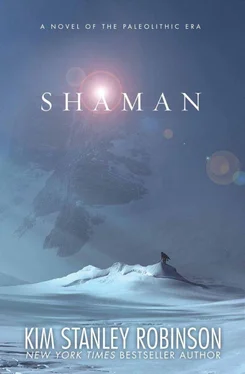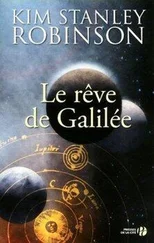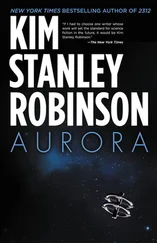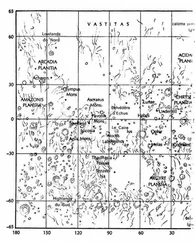Farther down the wall, to the right of the crack, a stone in the shape of a bison’s pizzle hung from the ceiling. Drawn on the side of it was a woman’s kolby, again so black it was another hole in the rock, triangular this time, the black wedge tucked between legs that went pointy below the knee. The vertical slit of the kolbos was an intense white; it had been cut into the bottom of the triangle, etched with a burin, so that against the solid black of the vixen it was a glowing white line. The crack, the slit, the kolby, the baginaren, the way-to-bliss.
To the right, hovering over this naked woman’s legs, loomed a bison man about to mount her, his left leg hooking at her left leg, about to pull her legs apart and plunge into her. It was clear as could be.
Thorn laughed when he saw Loon goggling at it.
—That was Pika, he explained.—He would do anything.
Thorn lit a spill of dry pine needles from his lamp flame, and straightened up and used the flare to light his pipe. He breathed in his smoke deeply, then breathed it out onto a blank part of the wall. He hugged that part of the wall with his arms spread wide, and Loon feared he would merge into it and leave Loon all alone. But he came back and sat down, and they prepared the paint in a bowl, mixing some black powder Thorn carried in a sachet with water from his water bag. He was going to use black paint and charcoal sticks both, he explained. He began humming a deep resonant hum, which seemed to resound from first one part of the recess and then another.
He stood again and kissed the rock wall, then rubbed his hands over a bulge he declared to be a lion’s shoulder, feeling each little crack and declivity with his fingertips, then his lips. The wall was covered with fine cracks, but otherwise it was a very clean face.
Thorn sang his exhales:—Ahhhhhh, ahhhhhh, ahhhhh, always in a steady tone. The cave hummed back,—Ahhhhhhhhhhh. Loon felt the sound in his skin, and then his bones. He too hummed, it seemed involuntarily, as if he were a drumskin helplessly vibrating. It was like a kind of shivering, as if the chill of the cave was penetrating him and making a sound like river ice in the sun. Everything in the cave at that moment was humming that same Ahhhhh, and the vibration helped Loon to fight the cold, which flowed up from the floor into his feet like a flood of water. Ahhhhhh, ahhhhhh, ahhhhhh…
Thorn was still attending to the wall, head cocked to the side. He drew a line with his charcoal stick, stepped back and took a huge breath in, exhaled loudly.—Ha, he said.—Good. Let’s get started then. Oh now we come to you, mother, sister! A hunt I saw myself, on a midsummer day.
He chose the stick he wanted to start with, and flattened one side of it with his blade, working gingerly so that he wouldn’t break the brittle charcoal. When he was done he dipped the tip in their bowl of black paint and stood up.
When he pressed the charcoal end of the stick over the blank wall, he sang,—Ahhhh. The wall sang back,—Arrrr. Thorn’s head tilted to the left as he drew, and his whole body tensed like a cat on the hunt, then relaxed, then bunched up again as he drew some more. He moved smoothly, made each line in a single continous motion. The round bulge in the wall became the shoulder of a lion. Then a head, as in a three-liner. Ears were blacked on their insides, rounded and pointed forward: the big cat was listening. Both eyes were visible at the front of his face, gaze very intent to the left. Then another head in front and beneath that one, long and scowling, ears flattened back on the head, a foreleg reaching ahead. Then a foreleg almost horizontal ahead of that, detached and by itself; clearly the same foreleg in the next instant. The lion was making her dash for the kill.
Loon gaped as he watched Thorn work. Another head emerged before the charging lion, mouth open and eye round, pupil placed most carefully to show where the lion was looking. Then a giant head, the biggest of them all, leading the way: this one slobbered with hunger as he stared ahead. Then a three-liner of a smaller head, and another one.
When those were completed, Thorn sat on the ground behind the lamps and stared at what he had done. Then he jumped up with a newly prepared stick and began again.—Ahhhhhh.
More lions, and some smudging with both fingers and stick ends, to darken certain parts of the heads. He dipped his fingers, or a little pad of moss, into the black paint, then applied it very gently. Now the lions were flowing left in their dash, six lion heads, bigger and smaller, blacked or three-lined, with some free squiggles and detached forelegs to emphasize the flow. In the lamplight they all quivered together.
Above these Thorn added two lions who were ignoring the hunt, touching noses the way cats in a pack did. Above them then, a lion with a snout almost elongated into a cave bear shape, slobbering eyelessly. That was the hungriest lion. To its right another one appeared both in profile, as was normal, and yet also turned toward the observer, both in the same head space.
Thorn then did some scraping with a burin to get the space around the black heads even whiter. One big lion head had three rows of whisker spots dotting its muzzle, over a tight mouth. They looked just that way out in the world; when hunting they were very intent and serious people, and pursed their mouths like unhappy old men thinking something over. Now Thorn dotted whiskers on the one above also, an afterthought it appeared.
—Wait, I see something, Thorn said.
—The animals they’re hunting, Loon guessed.
—Exactly. They were hunting eight bison.
As far as Loon could tell there was not room for eight bison on the left end of the lions’ wall, where a fold tilted away into darkness. Loon watched curiously as Thorn worked, first taking a caribou shinbone and scraping the lower part of the space left, then drawing a bison with a rhino’s horn, some kind of joke or odd perspective. Above that a clutch of bison heads, all in profile except for the one to the farthest left, who looked straight out at the viewer with a suspicious round white eye. All the bisons’ nostrils were pinched shut unhappily, and they squinted, except for that one looking out at Loon from under its sweet curve of horns. Animals were seldom painted front on, but Loon enjoyed seeing the characteristic double curve of horns one saw when a bison was regarding you: out, in, out.
Now Thorn was almost climbing into the wall as he used a pad of moss to stump-black some of the bison heads. His nose appeared to touch what he was doing, as if he were blacking with it. The three bison heads at the top were the darkest masses on the whole wall, it almost seemed as if they were coming out of the wall, perhaps to evade the lions, whose flowing pursuit seemed to dive slightly into the wall. Yes, they were making their escape: it was as clear as could be.
At the far left edge of his painting, Thorn took up a new charcoal stick and quickly blacked the entire wall where it curved away, giving the whole scene something like a black riverbank containing it. Now the vision of the hunt hung in space before them, melting into Mother Earth, emerging from Mother Earth. Loon found he was standing; he couldn’t remember standing up. His arms were wrapped around his chest.
Thorn moved back beside him and regarded his work.
—Ah, good, he said.—They were really coming tonight. What a thing, eh? Lions on the hunt.
—I can see them move, Loon said.
—Yes, good. Do you see how I did that? It’s a thing you can learn. They have to be each in their own space, and a little stretched in the way you want them to move. Different sizes, and a little elongation, and some extra lines.
—And like that foreleg. Just there by themselves, I mean.
Читать дальше











